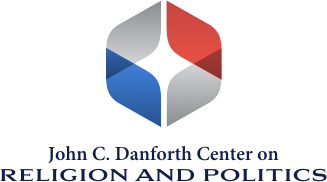John C. Danforth Center on Religion and Politics Awards Postdoctoral Fellowships for 2018-2020

The John C. Danforth Center on Religion and Politics at Washington University in St. Louis is pleased to announce it has awarded four postdoctoral fellowships to exceptional early career scholars. The fellowships will begin with the 2018-2019 academic year and are renewable for the following year.
 Aaron Griffith is a doctoral candidate in the Divinity School at Duke University. His dissertation, “American Law and Gospel: Evangelicals in the Age of Mass Incarceration,” charts the history of evangelical Christian influence in American criminal justice and prisons in second half of the twentieth century. The project argues that as postwar evangelicals positioned their religious movement as reputable and racially moderate, they helped do the same for the cause of punishment—bolstering the justice system’s claims to neutrality and its insistence that punishment could be colorblind, even as it increasingly incarcerated poor people of color. Yet ministries to prisoners and juvenile delinquents also opened evangelicals’ eyes to the regular mistreatment of offenders, pushing them into prison reform and restorative justice efforts.
Aaron Griffith is a doctoral candidate in the Divinity School at Duke University. His dissertation, “American Law and Gospel: Evangelicals in the Age of Mass Incarceration,” charts the history of evangelical Christian influence in American criminal justice and prisons in second half of the twentieth century. The project argues that as postwar evangelicals positioned their religious movement as reputable and racially moderate, they helped do the same for the cause of punishment—bolstering the justice system’s claims to neutrality and its insistence that punishment could be colorblind, even as it increasingly incarcerated poor people of color. Yet ministries to prisoners and juvenile delinquents also opened evangelicals’ eyes to the regular mistreatment of offenders, pushing them into prison reform and restorative justice efforts.
 Dana Lloyd is a doctoral candidate in the Department of Religion at Syracuse University. Her dissertation, entitled “Between God and Land: On Sovereignty, Indigeneity, and Religious Freedom,” focuses on the U.S. Supreme Court case Lyng v. Northwest Indian Cemetery Protective Association, a 1988 landmark case that denied the right of three American Indian nations to the free exercise of their religion for the sake of protecting property rights of the federal government. She completed law school and holds an LL.M. and an M.A. in Philosophy from Tel Aviv University.
Dana Lloyd is a doctoral candidate in the Department of Religion at Syracuse University. Her dissertation, entitled “Between God and Land: On Sovereignty, Indigeneity, and Religious Freedom,” focuses on the U.S. Supreme Court case Lyng v. Northwest Indian Cemetery Protective Association, a 1988 landmark case that denied the right of three American Indian nations to the free exercise of their religion for the sake of protecting property rights of the federal government. She completed law school and holds an LL.M. and an M.A. in Philosophy from Tel Aviv University.
 Charlie McCrary is a Ph.D. candidate in the Department of Religion at Florida State University. In December, he defended his dissertation, “Sincerely Held Religious Belief: A History,” which will become a book titled “Sincerely Held: American Religion, Secularism, and Belief.” The project examines the roles of religious sincerity and “sincerely held religious belief” in the U.S. state’s regulation of religion and interactions with believers, with case studies ranging from the nineteenth century to the twenty-first. It focuses especially on religious outsiders, including spiritualist women fortune tellers, leaders of new religious movements, eclectic conscientious objectors, and a radical black nationalist group.
Charlie McCrary is a Ph.D. candidate in the Department of Religion at Florida State University. In December, he defended his dissertation, “Sincerely Held Religious Belief: A History,” which will become a book titled “Sincerely Held: American Religion, Secularism, and Belief.” The project examines the roles of religious sincerity and “sincerely held religious belief” in the U.S. state’s regulation of religion and interactions with believers, with case studies ranging from the nineteenth century to the twenty-first. It focuses especially on religious outsiders, including spiritualist women fortune tellers, leaders of new religious movements, eclectic conscientious objectors, and a radical black nationalist group.
 Cyrus O’Brien is a Ph.D. candidate in the Interdisciplinary Doctoral Program in Anthropology and History at the University of Michigan. His dissertation, “Faith in Imprisonment: Religion and the Development of Mass Incarceration in Florida,” places religion at the center of the study of mass incarceration in the United States. It traces religion’s changing roles as Florida’s prison system expanded from an archipelago of small labor camps at the outset of World War II into one of the world’s largest criminal justice systems. Blending archival research with deep ethnographic data and interviews, it demonstrates that religion was a key force in the adoption of parole, the embrace of halfway houses, and the privatization of prisons.
Cyrus O’Brien is a Ph.D. candidate in the Interdisciplinary Doctoral Program in Anthropology and History at the University of Michigan. His dissertation, “Faith in Imprisonment: Religion and the Development of Mass Incarceration in Florida,” places religion at the center of the study of mass incarceration in the United States. It traces religion’s changing roles as Florida’s prison system expanded from an archipelago of small labor camps at the outset of World War II into one of the world’s largest criminal justice systems. Blending archival research with deep ethnographic data and interviews, it demonstrates that religion was a key force in the adoption of parole, the embrace of halfway houses, and the privatization of prisons.
These awards are one expression of the Center’s mission to support scholars early in their careers. Fellows will work to complete their first book projects during their term at the Center and will participate in the intellectual life of the Danforth Center on Religion and Politics, and the University, through teaching courses and joining the Center’s biweekly interdisciplinary seminar.
The John C. Danforth Center on Religion and Politics was established in 2010 and is located on the campus of Washington University in St. Louis. The Center serves as an open venue for fostering rigorous scholarship and informing broad academic and public communities about the intersections of religion and U.S. politics.
For more information about the Center’s fellowship programs, please see http://rap.wustl.edu/fellowships/.

